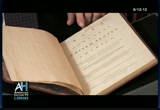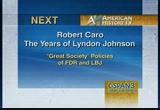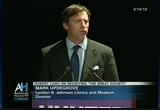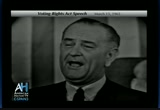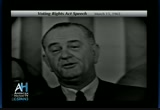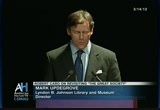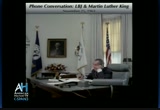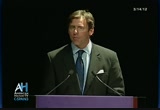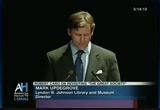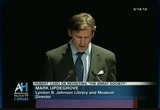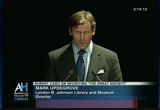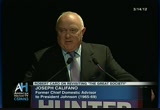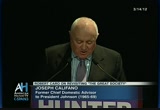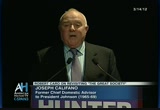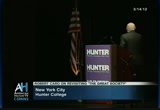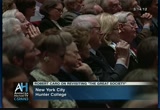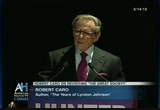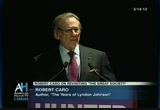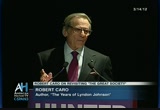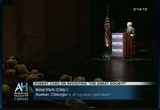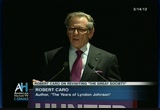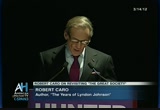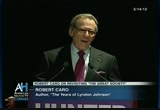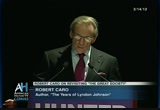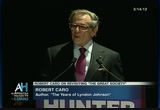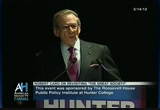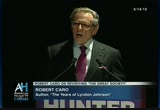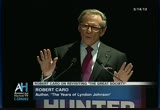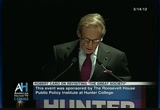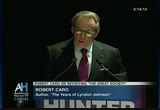tv [untitled] July 4, 2012 8:00pm-8:30pm EDT
8:00 pm
the title page carries a beautiful example of his signature. g. washington. okay $8,700,000. is there any advance? then selling. for $8,700,000. >> and that goes to mt. vernon. thank you very much. paddle 222. robert caro "the years of lyndon johnson" the fourth book in his series, and it captures lbj in the years from 1958 to 1964. his transition from the u.s. senate to the presidency. up next, mr. caro's keynote
8:01 pm
address during a symposium aimed at revisiting the great society policies and politics of franklin d. roosevelt and lyndon b. johnson. this is about 50 minutes. thank you. it is altogether appropriate that this conference be held at hunter college and at roosevelt house where we will convene tomorrow lyndon johnson served his president when this president was first elected to congress in 1946. lbj, a new dealer by background, and at heart, believed in fdr and his vision for america. in many ways, the seeds of lbj's great society were planted in the fields of fdr's new deal.
8:02 pm
as johnson often said to his aides during his administration, i really intend to finish franklin roosevelt's revolution. but lbj's passion for social justice came well before fdr landed in the white house. before the joint session of congress, lbj talked about an experience as a young man that might have been the most formative of his life. >> my first job after college was as a teacher in texas, and a small, mexican-american school. few of them could speech english, and i couldn't speak much spanish. my students were poor, and they often came to class without breakfast, hungry, and they knew even in their youth the pain of prejudice.
8:03 pm
they never seemed to know why people disliked them, but they knew it was so because i saw it in their eyes. i often walked home late in the afternoon after the classes were finished wishing there was more that i could do, but all i knew was to teach them the little that i knew, hoping that it might help them against the hardships that lay ahead, and somehow you never forget what poverty and hatred can do when you see its scars on the hopeful face of a young child. i never thought then in 1928 that i would be standing here in 1965.
8:04 pm
it never even occurred to me in my fondest dreams that i might have the chance to help the sons and daughters of those students and to help people like them all over this country, but now i do have that chance, and i'll let you in on a secret. i mean to use it. >> with memories of those mexican-american schoolchildren seared in his conscience and racial strife alive and well in america in the mid 1960s, lbj took his own revolution where fdr had not, enlisting in the cause of civil rights and determined to put a legal end to racial apartheid in america. on november 25, 1963, on what was the second full day of his
8:05 pm
presidency, johnson called martin luther king, jr., and initiated what would become among the most productive and important partnerships of the 20th century. >> heard about your statement. i guess on tv, wasn't it? >> yeah, that's right. >> i've been locked up in this office and i haven't seen it, but i want to tell you how grateful i am and how worthy i am going to try to be of all of your hopes. >> well, thank you very much. i'm so happy to hear that. and i knew that you had just a great spirit. and you know you have our support and backing. and we know what a difficult period this is. >> it's an impossible period. we have a budget coming up. got nothing to do with it, practically already made and a civil rights bill that hasn't even passed the house and it's november and hubert humphrey told me yesterday everybody wanted to go home. we have a tax bill that they haven't touched. we just got the letter -- not
8:06 pm
letter upon any of them to keep going. and i guess they'll say that i'm repudiating but i'm going to ask the congress to just stay there until they pass them all. they won't do it, but we'll just keep them there members year to do it, and they just won't give up an inch. >> uh-huh. well, this is mighty fine. i think it's so imperative. i think one of the great tributes is to try to enact some of the great progressive policies he sought to initiate. >> i'm going split them all and i'm going to do my best to get other men to do likewise. i never needed it more than i do now. >> you know you have it. and feel free to call on us for anything. >> thank you so much, martin. >> all right. >> call me -- >> i sure will. call me when you're down here next time. >> i certainly will. >> let's get together. any suggestions you got, bring them in. >> fine. i certainly will do that. >> thank you so much. >> thank you.
8:07 pm
>> all men are created equal is an inherent part of the american creed. by working with martin luther king and others toward the civil rights acts of 1964 and 1968, the voting rights act of 1965 and other civil rights measures, lbj, more than any other president, helped to fulfill the promise of equal rights for all americans. that legislation came at a cost when johnson's friend and mentor, democratic senator richard russell of georgia warned him the passage of the civil rights act of 1964 would result in the democratic party's loss in the southern states, and his loss of the presidency in the fall election. johnson replied, if that is the price for this bill, i will gladly pay it. in fact, the democrats did lose the south, but johnson won the election of 1964 in a landslide.
8:08 pm
he used that mandate to fulfill other promises, enacting medicare, headstart, federal aid to education, immigration reform, environmental conservation and taking measures to weaken poverty's hold in america. the poverty rate plunged from 20% to 12% during the course of his administration. the great society might have swept even further into midwestern life if not for the mire of vietnam, a conflict johnson inherited from president as eisenhower and kennedy. as lbj escalated the war with no resolution in sight, divisions spread across the country. on any given day on the latter part of his presidency, protesters could be heard outside of the white house gates chanting hey, hey, lbj, how many kids did you kill today? lbj agonized over the war which resulted in the loss of 36,000 u.s. troops by the time he ended
8:09 pm
his white house reign in 1969. but as this conference will reflect lbj's formidable legacy of liberty continues to resonate, uniting us today far beyond the divisions of yesteryear. come, let us reason together is johnson's favorite biblical passage. by reaching across the aisle appealing to reason or fostering togetherness, he not only appealed fdr's revolution, but left his own indelible mark on america. his ultimate aim was to use his power to do the greatest good for the greatest number, hey, hey, lbj, my, oh, my, we could use you today. one of johnson's chief architects in building his great society was a young new yorker
8:10 pm
named joe calafano who served as special assistant to the president in 1965 to 1969. he then went on to become secretary of health, education and welfare for jimmy carter. he is currently an advisory board member for the roosevelt house public policy institute and as president raab mentioned, a catalyst for this conference. ladies and gentlemen, please join me in welcoming to the stage, joe calfano. >> thank you. thank you. >> i'm standing between you and robert caro, so i'll be short. bob caro is fascinated with the exercise of power and those who exercise it. that fascination led him to write the power broker, his brilliant biography of robert moses that set a whole new standard for a political biography. today i view that pulitzer
8:11 pm
prize-winning book as his warm up for tackling lyndon johnson, the most intelligent, complicated, committed, inspiring and infuriating person i've ever worked for. bob caro is lyndon johnson's most demanding and meticulous biographer. bob is fond of saying that, and i quote, to understand power you not only have to show how it is used, but also its effect on those on whom it is used. you have to show the effect of power on the powerless. no wonder he has become obsessed with lyndon johnson. bob caro has worked for 40 years to give the world lbj with the bark off, his highs and lows, how this president gave new meaning to the word machiavellian, as he gave new
8:12 pm
hope to the most vulnerable among us. robert caro gives no quarter to the subjects he writes about, so we should all take notice of what he wrote about the president and master of the senate his third johnson volume. in the 20th century, caro wrote, with its 18 american presidents, lyndon banes johnson was the greatest champion that black americans and mexican-americans and indeed all americans of color had in the white house. the greatest champion they had in all of the halls of government. he was the lawmaker for the poor and downtrodden and the oppressed. the president who wrote mercy and justice into the statute books by which america was governed, end quote. bob caro's three volumes on lbj have already won him a second pulitzer prize, and a second national book award, and too many other prizes and accolades for me to mention in any introduction. one thing is certain, lbj has
8:13 pm
given bob caro plenty of material to win more prizes with his next volume, "passage of power" about the years from 1958 to 1964 when johnson was vice president part of those years which will be out in may and with his final volume on the white house years and beyond due out in a couple of years. indeed, publisher's weekly and the issue coming out on april 1st has already called his forthcoming volume compelling, insightful and a one that will thrill all those who care about american politics. bob is back there. bosh has spent some 40 years with lyndon johnson and he looks great. bill moyers and i spent about three years with him in the white house and we're still exhausted every time we think about it. ladies and gentlemen, the great
8:14 pm
bob caro. >> thank you. >> joe, that was such a nice introduction that i'm reminded of what lyndon johnson used to say when he used to get an especially nice introduction. he used to say he wished his parents were alive to hear it because his father would have loved it and his mother would have believed it. you know what winson churchill said when he was asked in his great biography of lord marlboro, he said i'm working on the fifth of projected four volumes. well, not to equate myself with winston churchill, but i'm in the same boat and in a way, this talk tonight is an explanation of how i got there. the role of government, the responsibilities of government, that's the theme of this
8:15 pm
symposium and the focus on lyndon baines johnson, 36th president of the united states. on lyndon johnson's concept of what the role of government should be, and that theme be explored in detail in the panels tonight and tomorrow. but to begin this conference i will talk about the origins of this concept, about its beginnings, about where lyndon johnson's belief in the role of government came from, about the most fundamental, basic, beginnings from lyndon johnson and not the beginnings of lyndon johnson, but the beginnings before washington and i will also talk about the origins not only of lyndon johnson's general beliefs, about the role and responsibility of government and also about the origins of the program in which, in a way, he announced his belief to the northern people, about the program in which just seven
8:16 pm
weeks after president kennedy's assassination, in his first state of the union address, johnson enunciated quite clearly his concept of what the role of government should be. it's the program in which he began his great society, the war on poverty. for lyndon johnson, the beginnings are all in the place he came from, the place in which he was born and raised the texas hill country. i've talked about the hill country before. but i don't think you can talk about it too much, particularly in new york city. i saw what that meant growing up there myself and it was quite a shock. i grew up in new york city which is this place of fast-paced conversations and busy streets, theaters and everything else. it was a 9:00 plane from laguardia to boston and i take
8:17 pm
that plane and sometimes when i got off that plane i felt you'd rent a car and drive west out of boston into the hill country and on those days i felt like i was going from one end of the earth to the other. i'll never forget the first time i drove out there about 40 miles out of austin as you're heading toward johnson city, there's a rise and they call it a round mountain, but it's just a tall hill, but as i came to the top of it, something made me pull my car over to the side of the road and get out on the shoulder and look down in front of me because i was looking at something that i had never seen before in my life. it was just emptiness. i was looking at a valley and i later found out it was 42 miles long and 15 miles across, and when i stood there first and looked at it, i felt that there wasn't a single human thing in it to be seen. just a tremendous expanse of
8:18 pm
emptiness and then something happened, the cloud moved in front of the sun or away from the sun or something and all of a sudden there was a light glinting off a little huddle of houses in the middle of the empty space and that was johnson city, texas and lyndon johnson was growing up and the population there was 367 at one point. when i came out it was 362, and i think i had stopped the car then and got out of it because i realized i was confronting something that i had never seen before and i really wasn't equipped to deal with. as i started to interview lyndon johnson -- you know, lyndon johnson died so young at the age of 64. and i came along so quickly after he had died, that all the people who knew him, who grew up with him in johnson city, they were just about all still there.
8:19 pm
his best friend in high school was truman force. truman force had moved to a bigger house, but he was still in johnson city, just a couple of blocks away. his first girlfriend was kitty clyde ross, and she was kitty clyde leonard and she actually still lived in her parents' house, and i started to learn about this land. the land, it starts just -- it's now, of course, pushed out into it, but then the hill country began just at the western edge of austin and rolled west and it encompasses 23,000 square miles which is an area big enough to put all of new england in it and still have room for pennsylvania, and the population at that time was about three people per square mile. the first settlers called it the land of endless horizons because every time you got to the top of one line of hills you found that there was another one beyond it. there's a land of incredible loneliness as i started to talk to people there. i'll never forget lyndon johnson.
8:20 pm
the johnsons for a large part of lyndon's boyhood didn't even live in johnson city. they lived 18 miles beyond the johnson ranch and lyndon's brother sam houston johnson, once told me they were so lonely out there that one corner of the ranch came down to what they called the austin-fredericksburg highway, which is really just an unpaved path between austin and fredericksburg, and he told me how he and lyndon would go down and sit on this corner of the fence, hour after hour, hoping for one new face to come along so they would have someone new to talk to. the land of almost incredible poverty, was there almost no cash there. you could get a dime from selling a dozen eggs, but you had to go to marble falls to sell it. marble falls was 22 miles away across the hills. and a friend of lyndon johnson's told me how he used to on saturdays ride those 22 miles carrying a dozen eggs in a
8:21 pm
basket in front of him, carrying them like this, so they wouldn't break. 22 miles like that to get a dime. and i came to realize that being from new york, i simply wasn't understanding. i came back and i told him one night, i'm not understanding these people and i'm not understanding this country, therefore, i'm not understanding lyndon johnson. would you mind if we moved here. ina, of course, said okay and for three years we rented a house up in the hill country, and i would spend day after day driving around, interviewing these people. every interview seemed to be 180 miles from the one before. interviewing these people who grew up with lyndon johnson and went to college with lyndon johnson or were members of his first political machine. when you move to a world that opens up to you in ways that you can't imagine and one thing i've heard and we all heard, if you read about lyndon johnson, you cite a wonderful journalist for
8:22 pm
"time" magazine has a poignant scene in his book on johnson's presidency, where following a cabinet meeting, johnson says -- he says following cabinet meetings, johnson would often say i had two road scholars at the table, and one graduate of southwest texas state teaches college and he said johnson would always laugh loudly at that. too loudly. and i didn't really understand what lyndon johnson's education -- the effect that it had on him until i went down to the college and found the textbooks that they used and they say, do you like textbooks that you would use in new york, and that was a college education i found a friend of his, a guy named joe barry who later became a professor at bryn mawr. he said when i got to bryn mawr,
8:23 pm
i realized i couldn't talk to anybody about anything. i felt i had been cheated out of an education. so that's part of lyndon johnson's upbringing, but it also showed me, living there, just how remarkable were his unique abilities to use the powers of government to improve the lives of people. while i was interviewing in the hill country, i came to realize that i was hearing the same thing over and over. they would tell me these stories about johnson's ruthlessness and his cruelty or just cruelty for the sake of being cruel, but then i would hear over and over they would say no matter what lyndon was like, we loved him because he brought the lights. well, brought the lights. i knew what brought the lights meant. i knew from reading when johnson became congressman in 1937 at the age of 28 and there was no electricity in the hill country and during his term as congressman he brought electricity to the hill country, but because i came from new york city where electricity was still
8:24 pm
there and you turned the light switch and it was on, i understood intellectually what bringing electricity meant, but i didn't understand what it meant or what the lives of the people of the hill country were like without it. because they didn't have electricity, of course, they didn't have movies, they didn't have radio programs. one of the poignant things they told me was so many of these farmers and ranchers would say we loved fdr. he saved my ranch, and he saved my farm. we heard all about these wonderful fireside chats and we couldn't hear the fireside chats. the only radios they had in the hill country were these crystal sets and they would describe sitting there while roosevelt was talking and moving the needle back and forth on the dial and trying to make his voice come in clearly. but movies and radio are just entertainment. not having electricity means something a lot deeper than that.
8:25 pm
you can say it all. you don't have washing machines, et cetera, but you can say it most basically, perhaps, in water. for us, we just turn a faucet and because of electric pumps, the water comes out. but in the hill country, waters came from streams and wells and now that streams are generally small and dried up for a large part of the year. they had to get water out of the wells and the water out of the hill country in general is 75 feet deep, so they had a big well, 75 feet and bring up water from it. if the department of agriculture tells us that at that time the average family used 200 gallons of water each day or 73,000 gallons or 300 tons per year and that water had to be brought up from the wells by the women, by the wives of the house because the husband was out in the field working all day and there was so little cash in the hill country that as soon as the children got
8:26 pm
old enough to work they had to work what they called call off the farm on more prosperous farms in other nearby areas of texas for a dollar a day to earn some cash money. so the woman of the house would be left there alone. i couldn't get -- i had a hard time getting these women to talk to me at the beginning because, incredibly enough, they were very shy. very shy about talking to someone from the city, so i, as a matter of fact, learned to make fig preserves, and she would go and become friends with the women. and then i could go back and they would talk to me more freely. and they would say to me, you're a city boy. she says, you don't know what bringing the water meant. they would say -- and they would go to their attic or their garage, and they would bring out a bucket of water, often with the rope still attached, frayed old rope attached.
8:27 pm
and they would take me over to the wells which were always covered by these boards and you pushed the boards aside and they'd say, they dropped the bucket in and they would say you're a city boy and you don't know how heavy a bucket of water is and a bucket of water you find out is heavy. you pull it up. in fact, it was too heavy for these women orphaned. so what they would do is they have the metal thing over the well and they put the rope over it and they do what they call walking away. they haul up on the rope like this to pull the bucket of water out of the well. and that's the way they had to bring up all of this water they needed for household duties. then they would say to me, you know, it's easier to get it to the house if you do it two buckets at a time. you know how we did that, and i'll never forget the first time a woman went over to the garage and opened it and showed me her yoke because that's how these women carried the water with the yokes over their shoulders like
8:28 pm
cattle. you know, i realized that i was hearing another thing. i had been hearing another thing in a lot of these interviews with the women. they would say things, like do you see how round-shouldered i am, do you see how stooped i am, bent. do you see how bent i am. the word in the hill country is really bent. do you see how bent i am. in fact, i had sort of noticed that these women seemed a great deal more stooped than city women. i thought it was just because they were old, but they would say i got bent like this before my time. my back got bent like this when i was young. these women were stooped at 40, stooped at 35. one woman said to me, i swore that i wasn't going to look like my mother looked and then the babies started to come and i had to bring the water and i knew i
8:29 pm
would look exactly like my mother looked. they would show me what wash days were like because they didn't have electricity. they would take out four number three zinc wash tubs and you would line them up on your lawn and you would build a fire under each one and you transfer -- the first one was the lye soap and they didn't have enough money to buy store-bought soap so they had to make their own soap out of lye and there was another expression in the hill country. lye soap peels the skin off your hands like gloves. you put the first load of wash in and you scrub with the lye soap and they say you're a city boy, you don't know how heavy a load of wet wash is under a broom stick, do you? and it's very heavy. so the lye wash tub and the rinsing wash tub, the starch wash tub and the other end was
133 Views
IN COLLECTIONS
CSPAN3 Television Archive
Television Archive  Television Archive News Search Service
Television Archive News Search Service 
Uploaded by TV Archive on

 Live Music Archive
Live Music Archive Librivox Free Audio
Librivox Free Audio Metropolitan Museum
Metropolitan Museum Cleveland Museum of Art
Cleveland Museum of Art Internet Arcade
Internet Arcade Console Living Room
Console Living Room Books to Borrow
Books to Borrow Open Library
Open Library TV News
TV News Understanding 9/11
Understanding 9/11